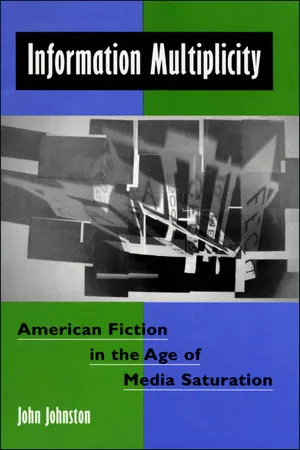
- English
- ePUB (mobile friendly)
- Available on iOS & Android
About this book
"With the birth of information theory and cybernetics in the late 1940s and early 1950s," writes John Johnston, "a decisive step was taken toward the immense techno-scientific transformation of the world into coded bits of 'information' and machinic assemblages." Beginning with Thomas Pynchon's The Crying of Lot 49, the novels that have reflected this transformation have similarly assembled disparate bits of information and narrative into fictions saturated with data and transcribed "clips" from media such as motion pictures, television, recordings, and computer files.
Realism having thus fractilized into high-speed collage, thought itself is redefined from the High Modernist "stream of consciousness" into what the machine psychologist Daniel Dennett refers to as "multiple drafts" or "circuits" operating concurrently in the human brain. In a series of close readings, Johnston traces how this viral influx of information into human consciousness has been replicated in works by Thomas Pynchon (Gravity's Rainbow and Vineland), Joseph McElroy (Lookout Cartridge), William Gaddis (J.R.), Don DeLillo (Libra), and William Gibson (Necromancer).
From John Johnston's Introduction: "Information multiplicities are profoundly corrosive of older cultural forms and identities, dissolving both subjects and objects alike into systems, processes and nodes in the circuits and flow of information exchange. But they also bring about new kinds of energy and even strange new forms of 'artificial life.' . . . Contemporary culture—or more specifically what is called postmordern techno- or cyberculture—is a restructuring process that can similarly be described: as an artifactual space created when information re-structures modern or traditional culture in order to make it a better habitat for information."
Frequently asked questions
- Essential is ideal for learners and professionals who enjoy exploring a wide range of subjects. Access the Essential Library with 800,000+ trusted titles and best-sellers across business, personal growth, and the humanities. Includes unlimited reading time and Standard Read Aloud voice.
- Complete: Perfect for advanced learners and researchers needing full, unrestricted access. Unlock 1.4M+ books across hundreds of subjects, including academic and specialized titles. The Complete Plan also includes advanced features like Premium Read Aloud and Research Assistant.
Please note we cannot support devices running on iOS 13 and Android 7 or earlier. Learn more about using the app.
Information
Table of contents
- Cover
- Half-Title Page
- Title Page
- Copyright Page
- Dedication
- Contents
- Acknowledgments
- Introduction
- Part I. Writing (in) the Machinic Universe
- Part II. The Novel of Information Multiplicity
- Part III. The Novel of Media Assemblages
- Coda “Change for the Machines”:The Complexity of Bodies in Synners
- Notes
- Index